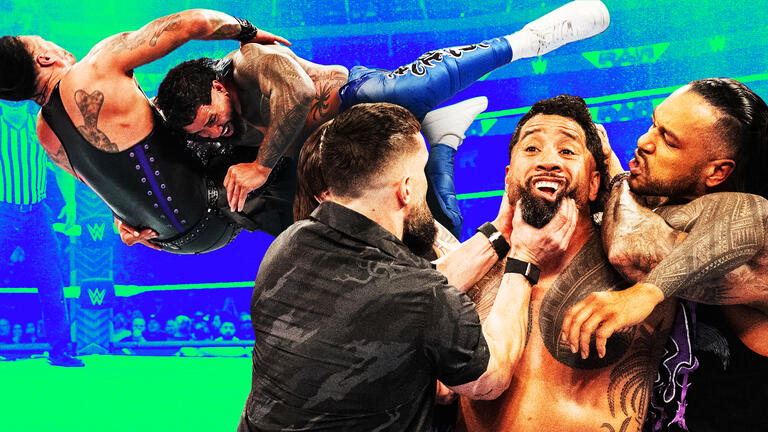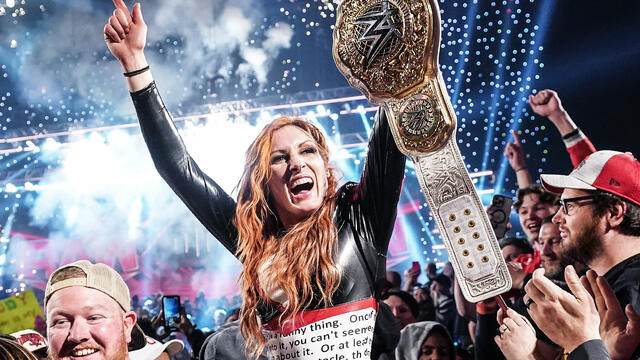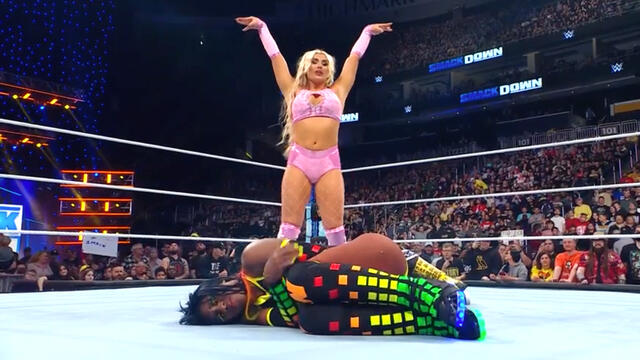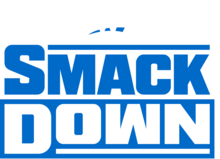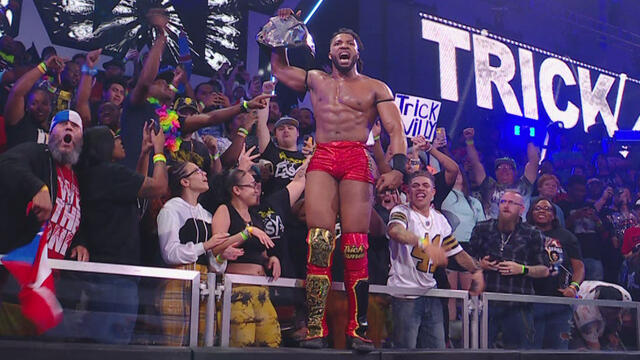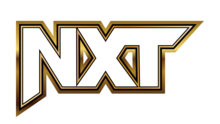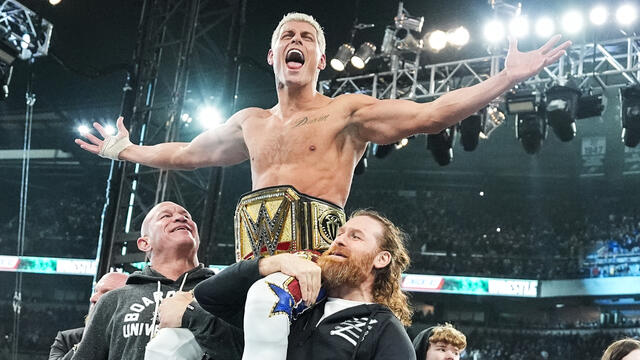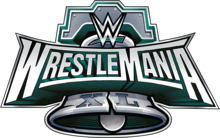What is DX's place in history?
These days, the world of sports is infatuated with making comparisons. Quite often, you’ll hear pundits ponder things like how the New York Yankees dynasty of the late 1990s would stack up against the Bronx Bombers of the 1920s and 1930s, or perhaps who would win a dream Super Bowl between the 2006 Pittsburgh Steelers and any other past Super Bowl champion. Even with individual athletes, you often hear statements proclaiming NBA star LeBron James as the “next Michael Jordan.”
This carries over into sports-entertainment as well. Fantasy warfare is a hot topic of discussion that is explored every month in RAW Magazine; in the June issue, it pits Mickie James against former WWE Diva Luna Vachon. And when Brock Lesnar first hit the scene, he was “the next big thing.” But the biggest debate comes when comparing some of the greatest groups in sports-entertainment history.
To a sports-entertainment fan, simply mentioning groups like The Four Horsemen, the New World Order, Evolution or D-Generation X is enough to trigger a ton of memorable moments. And when you ask which group is the best, an argument can be made for all of them. So where do the experts think DX stacks up against the rest of the best?
To one of the founding fathers of DX, the group is obviously number one.
“I’m partial to DX as far as actually who established the group concept,” said Shawn Michaels in an exclusive WWE.com interview. “We did the kinds of things that other people only thought about in the backs of their minds that would never normally see the light of day on live television.” Triple H, however, disagreed slightly. “I think the Horsemen were the best of all-time, because I was a fan watching them and they originated the group mentality. I would put DX next; it’s hard to say because I was in DX, but just as far as impact in the business, we were right there with Stone Cold Steve Austin in that time period.”
But what did the competition think? Dean Malenko, who was a member of the Four Horsemen in WCW when DX was running rampant in WWE, thinks that DX made themselves stand out.
“Those guys did some crazy things; they were entertaining and they pushed the envelope, but it gave them their own identity,” he said. “They all fed off of one another and it was entertaining. Unlike the Horsemen who were straightforward, or the nWo who were out only to defy what the boss wanted them to do, DX stood out from that standpoint.”
Of course, Malenko was the “target” of one of DX’s most
memorable moments, the invasion of WCW Nitro in Norfolk, Va. “When
they invaded Nitro, Eric Bischoff closed the doors and told everyone not to
go outside. But you can imagine the curiosity everyone had,” he said.
“It was unique and it gave the fans something to talk
about.”
As Triple H recalls, that moment wasn’t as easy for them as it
looked. “We had so many contingency plans for what might have
happened,” he said. “What if they open the door and we go in?
What happens if the WCW wrestlers want to fight us, or if we get arrested?
Luckily for us none of that happened and it ended up being a signature
moment.”
One thing about their legacy is undeniable: just as the New World Order turned around WCW’s fortunes in 1996, the rebellious DX did the same for WWE in 1997-98. “Stone Cold vs. Mr. McMahon was at the forefront, but we were right there,” recalls Shawn Michaels. “DX was easily number one-and-a-half, and remember, the Austin era didn’t really begin until he beat me at WrestleMania.”
Triple H agreed, saying that “there really is never one guy that makes or breaks the company. Even when Hulk Hogan was the man, everyone else around him helped feed into Hulkamania. At the time DX was around, a lot of components came together to make the business explode, and we had nothing to lose by going balls out.”
And to The Game, the surge only got stronger after Michaels left WWE in 1998. “A lot of people saw me as the sidekick and thought that DX was dead,” he remembers, “but when I added X-Pac and the Outlaws, we all got along and it was big. It was just a matter of time before the fans rallied to our side, and once we invaded WCW that was the turning point.”
Mick Foley, who was one of DX’s victims the night the Outlaws and X-Pac came into the fold, had no choice but to agree.
“Not only did Terry Funk & I lose the World Tag Team Championship that night, but we got massacred by DX. It showed that DX was a group to be taken seriously,” Foley remembered. “DX as a whole was bigger than the sum of their parts, and they embodied what the ‘Attitude’ era was all about.”
So why did a group of rebellious, obnoxious, loudmouthed punks become a huge hit with the fans?
“We were funny and cutting edge; we pushed the envelope,” said Triple H. “it was just like Austin. He was the guy flipping off his boss and beating him up. We were a little more juvenile, but we thought the way young, male adults do. It was just us being us, and it took off.” To HBK, it was more a matter of preying on this generation’s attitude. “Society was a little angrier and a little more rebellious; we were like that, so the fans could live vicariously through us,” he said.
Looking back, even Sgt. Slaughter, who was the victim of most of the original DX’s pranks, had to admit that DX was groundbreaking. “It was very hard to deal with them because they went against everything I stood for as Commissioner; it was like being the principal and trying to deal with the outlaw group of kids,” he said. “But, that’s what made them popular. They did everything their way, and you were either with them or against them. They held nothing back.”
Perhaps one of DX’s greatest qualities was that the group was a springboard for its members’ success. Much like joining Evolution helped Randy Orton become the youngest World Heavyweight Champion ever in 2004, DX propelled Triple H, X-Pac and the New Age Outlaws to the next level as well. So when Dean Malenko and the rest of the Radicals jumped from WCW to WWE in 2000, it was only natural that they joined forces with DX.
“Fighting DX right away and then joining them helped us as a group,” he said. “They were four established WWE Superstars and we were the new kids on the block. We stood toe to toe with them and it helped us prove ourselves to those that didn’t know us. When we finally aligned with them, people knew we were for real.”
So with all that said, what is truly DX’s biggest legacy? It depends on who you ask. Michaels, for one, doesn’t believe there is any. “I don’t grasp that whole legacy talk, because some people take it more seriously than others,” he said. “Triple H once said that we were the hottest thing in wrestling not named Steve Austin; to me, we were the first ones to make being a gang something people wanted to see.”
For The Game, it was more about what they did for the business as a whole than any individual accomplishments. “We opened up the business by pushing the envelope; some of the things that go on today happen because we opened that door. We never knew what was going to happen, but ratings went up and people reacted. We were edgy, and we took the business into places it had never been.”
And for those on the outside, perhaps DX’s greatest legacy is creating many memorable moments. “When they went down and invaded WCW, they started a war,” said Sgt. Slaughter. “No one will ever forget that, or the time they impersonated the Nation of Domination, or any number of the crazy things they did.”
When you boil it down, it’s almost impossible to “rank” the best groups in sports-entertainment history. Every group had their strong moments and their weak moments too, and groups such as The Horsemen, the nWo and DX all left different imprints in the world of sports-entertainment.
So to answer the question of where they stack up, take it from Triple H himself. “I was part of Evolution with Ric Flair, who was also the cornerstone of the Four Horsemen. X-Pac was in the nWo. We’re all interconnected somehow, yet we’re all still different. Just to be thought of in the top echelon is an honor in itself.”
WWE Shows Latest Results
SmackDown results, April 19, 2024: Tiffany Stratton introduces Bayley and Naomi to Tiffy Time with a sneak attack
Full ResultsNXT Spring Breakin' 2024 Week One results: Trick Williams slays The Mad Dragon to become NXT Champion
Full Results